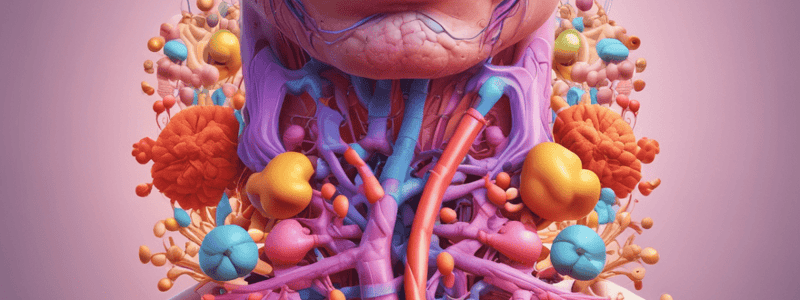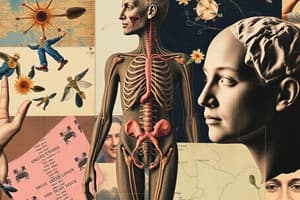Podcast
Questions and Answers
What role do hormones play in the body?
What role do hormones play in the body?
- Regulate body temperature
- Maintain muscle strength
- Control appetite
- Serve as chemical messengers to regulate bodily functions (correct)
Which gland acts as a link between the nervous system and the endocrine system?
Which gland acts as a link between the nervous system and the endocrine system?
- Hypothalamus (correct)
- Thyroid gland
- Pancreas
- Pituitary gland
How do hormones influence the body?
How do hormones influence the body?
- By increasing muscle mass
- By producing energy
- By acting on distant cells and organs (correct)
- By directly contacting target organs
Which of the following is NOT an example of a hormone?
Which of the following is NOT an example of a hormone?
What is the main function of the pituitary gland?
What is the main function of the pituitary gland?
Why are hormones classified based on their chemical composition?
Why are hormones classified based on their chemical composition?
Which of the following is an example of an endocrine disorder?
Which of the following is an example of an endocrine disorder?
What is the main function of the follicle-stimulating hormone (FSH) produced by the pituitary gland?
What is the main function of the follicle-stimulating hormone (FSH) produced by the pituitary gland?
Study Notes
Understanding the Endocrine System: Functions, Components, and Disorders
The endocrine system plays a crucial role in maintaining the body's internal equilibrium, known as homeostasis. It operates by releasing hormones, which are chemical messengers, into the bloodstream to regulate various bodily functions. By understanding the components of the endocrine system, including hormones and glands, and becoming aware of common endocrine disorders, we can appreciate its importance in overall health and wellbeing.
Hormones: Chemical Messengers
Hormones are essential signaling molecules produced by the endocrine system to maintain proper body function. They exist in minute quantities, but they can have profound effects on distant cells and organs, influencing processes such as growth, metabolism, and reproduction. Hormones are classified according to their chemical composition, including amino acids, polypeptides, and steroids. Examples of hormones are insulin, thyroid hormones, and sex hormones like testosterone and estrogen.
Major Endocrine Glands
Hypothalamus
The hypothalamus, located at the base of the brain, acts as a link between the nervous system and the endocrine system. It releases specialized hormones called hypothalamic releasing hormones, which influence the pituitary gland's function. These hormones also control body temperature, appetite, thirst, sleep patterns, and release of certain pituitary hormones.
Pituitary Gland
The pituitary gland is located near the base of the brain and influences the activities of the thyroid, adrenal cortex, and gonads. It produces growth hormone, prolactin, follicle-stimulating hormone (FSH), luteinizing hormone (LH), and thyroid-stimulating hormone (TSH), among others.
Thyroid Gland
The thyroid gland, situated in the neck, releases three key hormones: triiodothyronine (T3), thyroxine (T4), and calcitonin. These hormones regulate the body's energy levels, heart rate, digestion, and brain development.
Adrenal Glands
These glands, situated above each kidney, produce several hormones, including cortisol, aldosterone, and the sex hormones testosterone and estrogen. They help maintain salt and water balance, respond to stress, and influence sexual development and function.
Endocrine Disorders
Endocrine disorders result when there is a malfunction in hormone production or regulation within the endocrine system. Some common examples include hypoglycemia (low blood sugar), diabetes, infertility, thyroid conditions like hypothyroidism and hyperthyroidism, osteoporosis, and hormone-related cancers such as breast cancer and prostate cancer. Treatment often involves medication, lifestyle changes, and monitoring blood hormone levels.
In summary, understanding the endocrine system's components, functions, and potential disorders allows us to appreciate its role in maintaining overall health and wellbeing. By staying informed about endocrine system functioning, we can make more educated decisions regarding our own healthcare and advocate for accessible and equitable medical care for all individuals.
Studying That Suits You
Use AI to generate personalized quizzes and flashcards to suit your learning preferences.
Description
Test your knowledge about the functions, components, and disorders of the endocrine system. Learn about the major endocrine glands like the hypothalamus, pituitary gland, thyroid gland, and adrenal glands, as well as common endocrine disorders such as diabetes, hypothyroidism, and hormone-related cancers.




